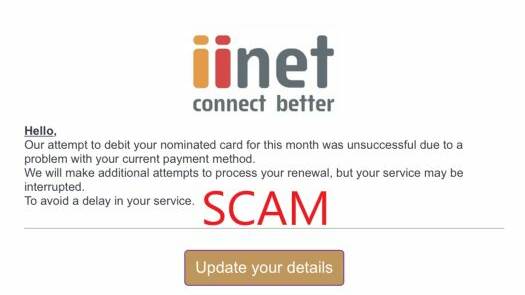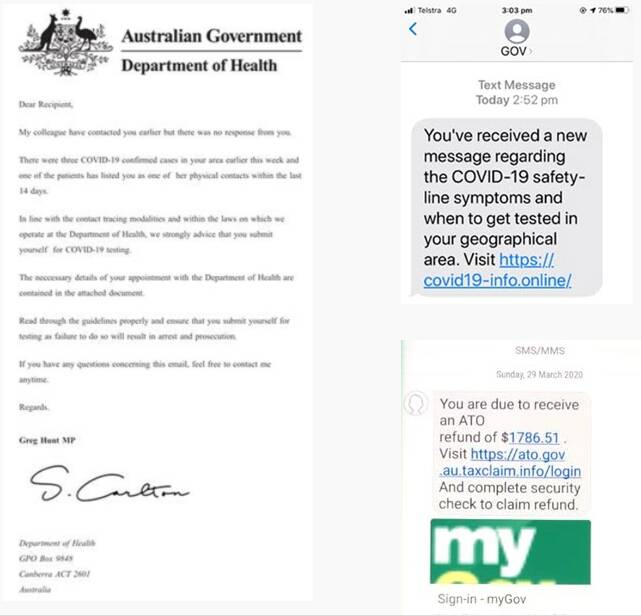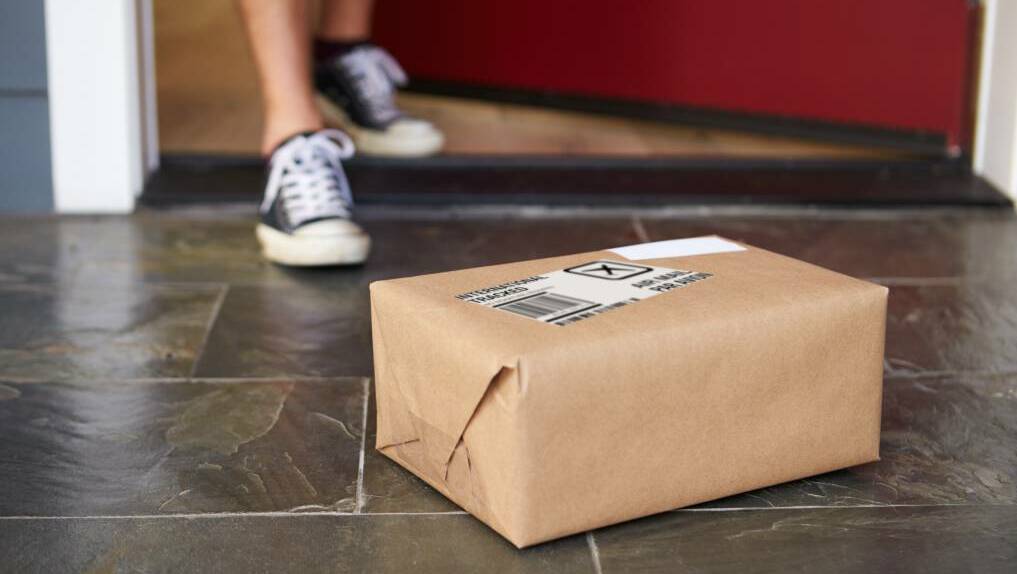The year has seen a fresh start for fraudsters and scam artists, seeing another spike in COVID-19 scams and text-based cons.
Australian Community Media has compiled a list of current scams identified on sites such as scamwatch.gov.au, cyber.gov.au and the Australian Competition and Consumer Commission's website dedicated to informing people about fraudulent and dishonest activities.
If you have been the victim of a scam report it to scamwatch.gov.au/report-a-scam.

Do your research, seek proof before buying pets online
- It can be hard to say no to a cute puppy but don't rush in and fall for a scam. If you're looking to buy or adopt a new pet, make sure you meet them in person before putting any money down.
- If you can't meet your new pet in person, take the time to reverse image search the photos used in the listing, and check with the relevant breeders association before sending any money.
- Do your research and beware of typical scam tactics, like requests for extra money for unexpected additional costs.
Don't be scammed out of your donation
- Scamwatch is urging residents wishing to donate to flood or Ukraine charitable appeals to check and make sure their donation is going to a legitimate organisation.
- Scammers often capitalise on a crisis and use current events to convince you to 'donate' to their scam.
- Only donate if you can verify that a charity is legitimate by searching the Australian Charities and Not-For-Profit's Commission register: acnc.gov.au/charity/programs/map.

Scam protection tip
- No Australian government or law enforcement agency will ever request remote access to your devices. If a "government worker" calls or texts and claims there is a problem with your device and asks to access it remotely, just hang up or delete the message because it is a scam.

Bills, invoices and subscriptions: makes sure it's not a scam
- Keeping track of subscription payments and bills can be tricky, however Scamwatch is urging people to be cautious about paying invoices that seem suspect.
- The website suggests taking the time to double check unexpected requests for money or personal information.
- Emails that claim a payment was unsuccessful may look convincing, but on second look there could be signs of a scam.
- If in doubt, contact the provider directly.
- Another tip for checking the email's validity includes looking at the the sender email address extremely carefully - in some cases the sender address may have a very slight difference to it or include a spelling mistake.
Online shopping red flags
- Scamwatch is sharing red flags people should look out for when buying products online. The authority stated that scam websites have become sophisticated and difficult to spot, especially if it is impersonating a legitimate business.
- Look out for products advertised at an unbelievably low price, or advertised to have amazing benefits or features that sound too good to be true, if a site's social media pages appear new and selling products at very low prices and limited information about delivery and other policies.
- Also be wary if an online retailer does not provide adequate information about privacy, terms and conditions of use, dispute resolution or contact details, or if the seller does not allow payment through a secure payment service such as PayPal or a credit card transaction.

Deny scammers remote access
- Scamwatch has reported that Australians have lost almost $1 million in remote access scams since the start of the year.
- Victims are being contacted by phone by a scammer impersonating tech support or fraud prevention, telling the person their device or account has been compromised and needs support to fix it.
- The scammer ask to remotely access the victim's computer or phone, to download remote access software and to accept the scammer's request to access the device.
- Once access is allowed, the scammer accesses the victim's banking or personal information, uses that information to impersonate the victim to commit identity theft or steal money.
- Scamwatch advises that anyone posing as a service provider, bank or government body asking you to download software and give them access to your device is scamming you and to never give anyone remote access to your device.
Too good to be true job offers
- Scamwatch is reminding the public of the old adage that if an offer seems too good to be true, it probably is, especially in relation to jobs.
- There have been more than 3400 reports made to Scamwatch about employment scams.
- This scam sees a victim receive a job offer, often out of the blue, by text or email. The offer is generic but 'guarantees' the person will make fast or easy money. The victim might be asked to pay a fee or purchase a 'starter kit', or provide personal details in order to secure the role.
- Scamwatch advises the public to beware of roles that promise big money for little effort, ask for a lot of personal information, or require you to purchase a 'starter kit' before you can start working.
Let your head lead your heart
- In a dating and romance scam, scammers build trust over time before asking for money or gifts. They will often claim they need money to come and visit, or to pay for bills or debts. Even if you think you can trust them, don't send money to someone you have only met online. Scammers also love using gift cards as a payment method as it's easy for them to sell the cards on for cash. If someone asks for payment in gift cards it is a scam.
MyGov refund scam
- Beware of a new refund scam now making the rounds, and any other emails promising money if you provide your personal details. An email claiming to be from MyGov states 'your refund is ready' and asks the recipient to complete the 'identity verification process'. This is not a legitimate email from MyGov. The from 'do not reply' email address is a giveaway that the email is a fake.
Beware rental fraud
- Looking for a new home? Beware of private rental scammers on classifieds sites who claim to have a property available. Search the address to make sure it isn't listed elsewhere, and always view the property in person before sending any money or personal information.
Hack scam to look out for
- Scammers can spoof (copy) your email address to make it look like they have accessed your device. If you get a message stating someone has accessed your device, has monitored your internet activity and provided 'proof' of that activity, this is a sextortion scam - you have not actually been hacked. If you receive an email like this report it to esafety.gov.au.

Hack scam to look out for
- Scammers can spoof (copy) your email address to make it look like they have accessed your device. If you get a message stating someone has accessed your device, has monitored your internet activity and provided 'proof' of that activity, this is a sextortion scam - you have not actually been hacked. If you receive an email like this report it to esafety.gov.au.
Online shopping
- When shopping online, beware of scammers who insist on third party payment or delivery services. They might claim to be a FIFO worker, defence personnel, or provide another excuse as to why they can't conduct the transaction in person. If in doubt, don't go ahead with the deal.
Educate yourself on scam types
- Phishing scams are attempts to trick you into giving out your personal info. If you receive a request to 'verify your details' and provide your bank accounts, passwords or credit card info, something's phishy. Learn more about how to recognise a scam type at scamwatch.gov.au.
When shopping online, beware of scammers who insist on third party payment or delivery services. They might claim to be a FIFO worker, defence personnel, or provide another excuse as to why they can’t conduct the transaction in person. If in doubt, don’t go ahead with the deal! pic.twitter.com/El2CSkYwif
— Scamwatch_gov_au (@Scamwatch_gov) January 24, 2022
Scamwatch smells a RAT
- Scamwatch has received reports about scams relating to rapid antigen tests (RATs). Avoid newly registered websites claiming to have supply and individuals re-selling tests. Only buy TGA approved RATs from known and trusted retailers or their online stores. In Australia, there are 22 TGA approved RAT tests. Information can be found at tga.gov.au.
Attempts to steal information
Scamwatch has received over 6415 scam reports related to the coronavirus with more than 9 million dollars in losses since the initial outbreak.
With vaccines and RATs in short supply in areas around Australia, some scam artists are taking the opportunity to ask for payment in exchange for early access to vaccines or tests.

Government impersonation
Many scams rely on getting you to click fraudulent links, and will impersonate government agencies or trustworthy groups to convince you to click the link. Fake texts that appear to be sent from a government agency can try and persuade you to give your personal information to fraudsters.
If it seems a government group wants you to check or input information on a website, access the website from a separate browser. Don't click the link sent, and never share personal or financial information over the phone. Just hang up.
Catfishing cons
Scam artists can and will often target emotional triggers such as loneliness or passion to get you to provide money, information or gifts.
Often through online dating websites but also seen on social media, fraudulent actors will pretend to be romantically interested and even begin a long-term relationship that can last for months before asking for money or information. In some scenarios, they'll even ask for intimate or revealing pictures that could be used as blackmail material.

'Sextortion' blackmail
On that note, sometimes scam artists will send you threatening text messages or emails threatening you with sharing intimate photos or videos with your friends, family or professional contacts.
These sorts of cons rely on the immediate fear of being embarrassed or shamed publicly to convince you to pay up, but they rarely have any actual material to threaten you with. They are trying to scare you, but that's all it is. Simply delete the message and don't engage.
And of course, don't put photos online that you would be uncomfortable with others seeing.

Flubot scams
Flubot scams are some of the most common attempts to steal information at the current time.
Australians are still receiving scam text messages about missed calls, voicemails, deliveries and photo uploads. The text messages ask you to tap on a link to download or access something. Doing so will download a specific type of malware to your device.
The most common version is preying on the rise in online shopping, offering updates on parcel tracking to convince you to click links sent through text messages. If you can't verify authenticity, don't click it.
Golden Rules
Remember, if something sounds too good to be true, it probably is. It's always best to approach any mysterious messages with skepticism and never click links that you don't recognise.
Never give personal, revealing or financial information over the phone or to somebody you don't know and trust.
If in doubt regarding the authenticity, get help. Consult a trusted friend, or contact authorities to verify the information.
Finally, nobody actually wants to be paid in gift cards except scam artists. Government agencies will absolutely never ask you to pay fines or fees with a gift card, and anyone asking for payment in the form of a gift card should be treated with caution.
More information on types of scams, reporting options and updates are available at scamwatch.gov.au.







